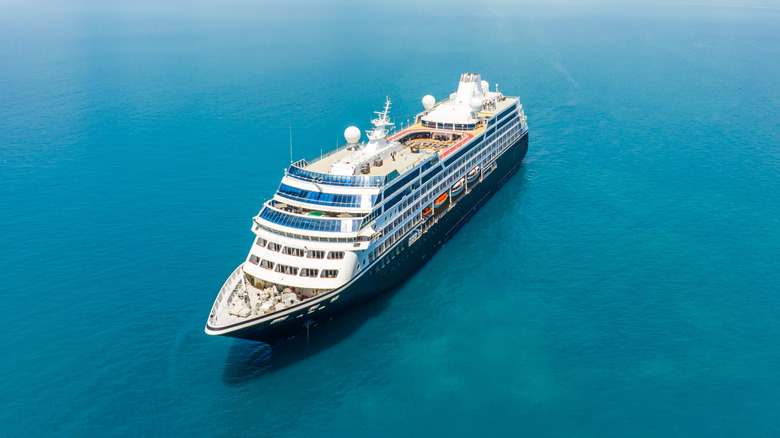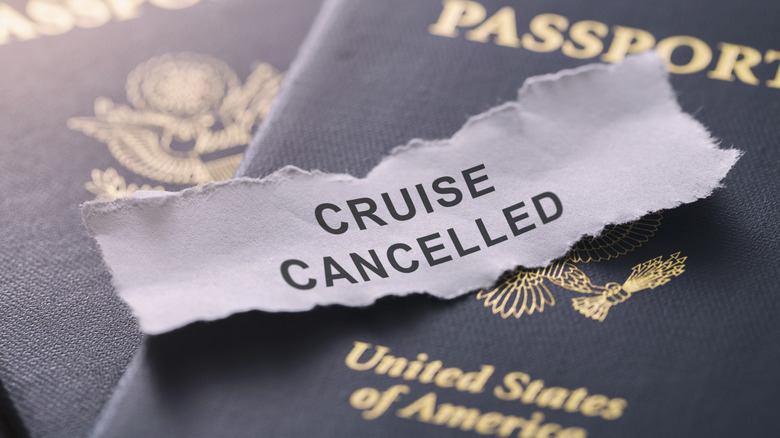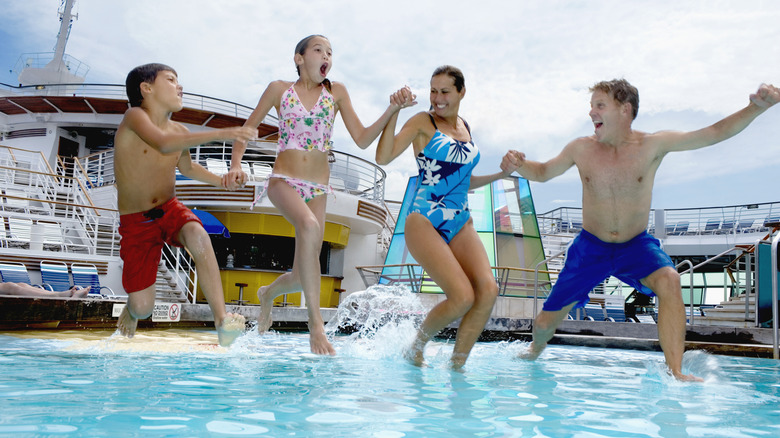Letting Children Roam Free On A Cruise Ship Can Have Unexpected Life-Long Consequences
In 2025, an estimated 19 million Americans will embark on ocean cruises, a record-breaking surge reflecting the industry's remarkable recovery form the COVID-19 pandemic. Cruises offer an alluring escape, blending sun-drenched poolside decks, endless dining and entertainment options, and exotic ports of call, catering to all walks of life. After years of restrictions, families are flocking to these floating resorts for their promise of relaxation and adventure. Yet underneath the idyllic surface can lie a false sense of security that can lead to devastating consequences, and there are many reasons why you shouldn't take a cruise.
Cruise ships, often perceived as safe havens, are akin to bustling urban cities, housing thousands of strangers in tight quarters. This environment can mirror the risks involved with cities — petty theft, public disorder, or even assault — demanding vigilance, especially for parents. The case of Linda S.'s family illustrates the perils of lax supervision.
On their Carnival Celebration cruise, Linda's 9-year-old-son, perhaps drawn by water slides and arcade rooms, wandered off on his own. His unsupervised exploration culminated in a lifetime ban from Carnival Cruise Line after he damaged an arcade machine and fought with another child. This incident not only disrupted their vacation but also barred the entire family from future Carnival cruises (unless they leave him at home), highlighting how a single lapse can reshape a family's future travel plans. The temptation of kid-friendly amenities can tempt children to roam, but cruise lines enforce strict rules to ensure safety, making parental oversight critical to avoid severe, lasting repercussions.
The high cost of unsupervised exploration
When Linda's son slipped away on the Carnival cruise, the consequences were swift and severe. Security footage revealed he had vandalized an arcade machine and clashed with another boy, prompting a 2AM visit from the cruise's security team. Despite Linda's apologies and agreement to supervise him for the remainder of the cruise, the family received a formal letter on their final day: her 9-year-old was banned for life from Carnival and its affiliate brands. Linda's offers to pay for damages and her explanation that her son's ADHD medication had lapsed were met with firm rejection from the company, even after legal appeals. Carnival's stance was clear: his actions compromised safety and guest enjoyment, warranting an inflexible ban.
The emotional toll of this could be profound, grappling with guilt and embarrassment, while the entire family faces the loss of a cherished vacation tradition. Financially, the family could risk canceled bookings and having to forfeit deposits already paid for future cruises. Public scrutiny can amplify such an ordeal, as social media and forums often sensationalize such incidents, pilling shame onto the family already reeling from their mistakes.
Cruise lines prioritize safety and liability, leaving little room for leniency. Once banned, or on the Do No Sail list, it can be nearly impossible to overturn decisions, as corporate reviews and legal efforts rarely sway cruise operators. This rigidity underscores the gravity of allowing children to roam freely, turning a momentary lapse in judgement into a lifelong penalty.
Safeguarding your cruising experience
To avoid bans and ensure safe cruising, parents should treat a ship like an unfamiliar city, keeping children under close watch unless they're in supervised kids' clubs. Behaviors leading to bans include ignoring safety protocols, vandalism, or disrupting other guests or cruise ship employees, any violation of cruise ship policies, or this unexpected activity. Parents should review rules before boarding and set clear boundaries and expectations with their children.
It's important to emphasize that vacations still demand good behavior, and that there will be consequences for misbehavior. Be proactive by helping your children understand basic navigation of the ship in case of separation, so they know how to get back to the room alone, or where they can find help. If parents do allow their kids to roam around freely, set regular check-in times and locations, equip kids with walkie talkies or ways to contact you should they need to, and make sure they know what to do in case of emergency.
Modeling responsible behavior is important for kids, as children often mimic what is shown to them, especially by parents. Parents must demonstrate respect for ship rules and policies as well. Consistent reminders about expectations and consequences can help to counter the large swaths of excitement that kids feel on vacations that can lead to missteps. If misbehavior occurs, enforce immediate consequences to reinforce accountability. While cruise ships brim with fun and excitement, they also require unwavering vigilance by parents. These idyllic floating cities in the sea can quickly become overcast with troubles otherwise. By prioritizing supervision and communication, parents might prevent minor oversights from escalating into permanent bans, and preserve their family's ability to enjoy a one of a kind escape without major disruptions.


